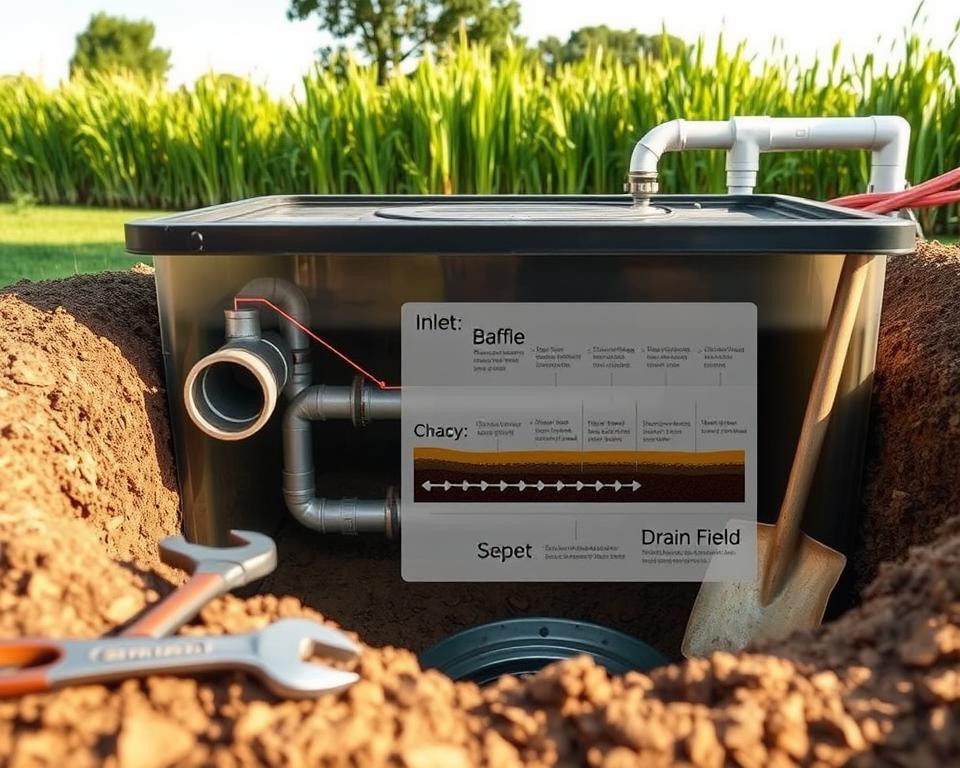Vital Tips for Septic System Pumping
Have you ever wondered how often you should arrange septic system pumping to avoid expensive malfunctions? With in excess of 20 percent of U.S. households depending on septic systems, grasping their maintenance is essential. Having a clear idea of when to book a septic tank service is key to its longevity. Additionally, there are budget-friendly septic pumping options that ensure excellent functionality while staying on budget. Below, we outline critical upkeep tips helpful for every homeowner.
Noteworthy Points
- Regular septic system pumping is essential for optimal performance.
- Identifying the signs that signal the necessity for service can ward off major issues.
- Choosing professional septic system pumpers ensures reliable maintenance.
- Budget-friendly septic pumping alternatives are accessible for homeowners.
- Routine inspections contribute to maximum system performance.
Understanding Your Septic System
A septic system plays a crucial role in processing household wastewater, comprising several integral components that operate together. The main drain line carries wastewater from your home to the septic tank, where the process begins. In the tank, an underground chamber, solids accumulate at the bottom, and bacteria break down these solids, processing the waste effectively.
The treated liquid discharge then flows from the septic tank to the distribution box, where it is dispersed evenly across the drain field or leach field. Here, the soil extends the filtration, additionally purify the wastewater. Grasping the functions of these septic system parts is vital. It enables homeowners to supervise and upkeep their systems effectively.
Understanding how your septic system operates lets you adopt preventive maintenance measures. It’s wise to have regular check-ins with licensed technicians of septic systems – septic tank inspection near me. They supply crucial insights for peak operation of your system. These experts aid in arranging the required pump-outs and checks. This proactive approach can significantly extend your septic system’s lifespan.
Importance of Septic System Maintenance
Caring for your septic tank consistently is pivotal for homeowners who aim for their system to remain reliable. A well-cared-for system delivers peace of mind and safeguards your property’s value. Without appropriate care, you’re risking system breakdowns and health dangers.
Choosing a top-notch septic pumping service is important. They provide timely inspections and pump-outs, clearing out sludge and scum buildup. If maintenance is neglected, urgent pumping may be required, which is costly.
Adhering to a consistent maintenance plan is smart. It entails professional evaluations and regular pumping. This preventive measure helps avoid urgent issues, ensuring a safer living environment for everyone.

How to Tell Your Septic System Requires Service
Being alert to septic system issues can sidestep costly repairs and major damage. Typical signs signal when your system requires a check. These consist of:
- Sluggish drains throughout the house
- Pooling water in the yard above the drain field
- Unpleasant odors near the septic tank or leach field
- Remarkably thick grass growth in particular areas of your yard
These signs could signify problems that might lead to your system failing. Swift intervention is essential. Calling in septic pumping experts for an inspection helps. Timely action prevents small issues from turning into major ones. Additionally, consistent upkeep guarantees your system operates well and lasts longer.
Septic System Pumping: Best Practices
Proper pumping of your septic tank is imperative to avoid hefty clogs and backups. It’s vital to determine the right frequency for maintenance. Homeowners should typically plan pumping every 2 to 5 years, depending on the tank’s size and household wastewater levels. Frequent use of garbage disposals may demand more frequent pumping.
Employing professional pumpers guarantees your tank gets a full clean and check-up. During pumping, specialists look for any issues, such as damaged baffles. Spotting these problems promptly avoids larger expenses and inconveniences later. Regular pumping schedules and expert help secure your septic system’s smooth operation.
Regular Inspections Keep Your Septic System Running
Periodic inspections are crucial for your septic system’s effectiveness. Septic system inspections reveal early issues before they grow. Experts advise inspections every three to five years, guided by system size and household usage. This avoids pricey fixes.
Keeping maintenance records is important for documenting your system’s condition. These records offer insights into previous inspections, repairs, and suitable intervals to schedule septic tank cleaning services. With this information, planning for future upkeep becomes easier, retaining septic systems in excellent shape.
Consistent inspections and detailed record-keeping not only enhance system efficiency but also lengthen its life. This strategy protects the environment and the investment in a safe, operational home.
| Inspection Type | Recommendation Frequency | Benefits |
|---|---|---|
| Visual Inspection | Annually | Identify surface issues |
| Professional Inspection | Every 3–5 years | Assess functionality and detect problems |
| Septic Tank Pumping | Every 3–6 years | Prevent overflow and system failure |
Water-Saving Habits for a Healthier Septic System
Efficient water use is crucial for keeping your septic system robust. It not only aids the environment but also boosts the performance of your home’s plumbing. By embracing straightforward, yet effective, conservation methods, homeowners can cut down on wastewater.
Space out your laundry activities over the week instead of doing them all at once. This enables the septic system to handle water better and avoids tank overflow. Choosing low-flow fixtures in your kitchens and bathrooms leads to considerable water savings, retaining the water pressure up while lowering the flow rate, thus lowering the amount of wastewater produced each day.
Quickly fixing leaks is another way to assist your septic system. Even a small leak can cause a large waste of water, stressing the septic system. Through frequent inspections and repairs, you contribute significantly to the system’s efficiency.
Prioritizing water conservation isn’t just good for your septic system; it’s also a step towards sustainable living. Making such practices into your daily routine benefits both your household and the planet.
Best Practices for Household Waste Disposal
Homeowners hold a crucial role in preserving their septic system’s health by managing household waste properly. It’s critical to avoid flushing non-biodegradable items like wipes, plastics, and other harmful products in the system. These items can cause clogs, resulting in costly repairs and a decrease in efficiency.
Recycling food scraps and organic materials is a beneficial alternative to sending them to landfill. This practice significantly cuts down on the amount of solid waste entering the septic tank. Focusing on biodegradable waste disposal supports the ecological balance needed for effective waste management.
It’s important to keep an eye on what goes down the drains. Non-decomposable items can requiredemand more frequent septic tank pumping. By understanding and observing correct waste disposal methods, you can ensure a more efficient and long-lasting septic system.
Safe Cleaning Products for Your Septic System
The health of your septic system is heavily influenced by your choice of cleaning products. Using septic-safe cleaning products is paramount. These products protect the balance of beneficial bacteria that break down waste. Many standard cleaners contain harmful chemicals that jeopardize this balance, causing pricey repairs or system failure.
Homeowners should look into natural alternatives that are both powerful and environmentally friendly. Common household items like baking soda, vinegar, and lemon juice are excellent choices. These natural cleaners are not only capable but also maintain your septic system’s health.
Steering clear of products that contain antibacterial agents and chlorine bleach is vital. Such substances damage the essential good bacteria, weakening your system’s functionality. By picking sustainable products, you protect both the efficiency and longevity of your septic system.
Bacterial Health and Your Septic System
Bacteria perform a vital role in keeping your septic system functional. They decompose solids on their own and improve nutrient processing. A lack of healthy bacteria can trigger system failure, resulting in hefty repairs.
Homeowners can improve their system by using organic additives. These products boost beneficial bacteria, making waste decomposition more effective. It’s important to opt for organic additives that are helpful, not harmful, to the septic environment.
A robust bacterial community is key to a septic system’s longevity and efficiency. It avoids solid buildup and lessens the need for regular pumping. Prioritizing bacterial health creates waste management more effective and eco-friendly.
Final Thoughts
Septic system care is vital for the life and functionality of your home’s wastewater system. Following essential maintenance tips avoids expensive repairs. Knowing routine pumping and inspections is paramount. This secures your septic system stays in peak condition.
Learning about your septic system’s operation and proper methods in water and waste management is crucial. Engaging professionals like All in Sanitation offers expertise. This supports your septic system’s long-term health and offers reassurance.
Investing in proper septic maintenance today delivers future benefits. It protects your home and enhances your family’s quality of life. Focusing on septic system care delivers confidence with a well-maintained system.

